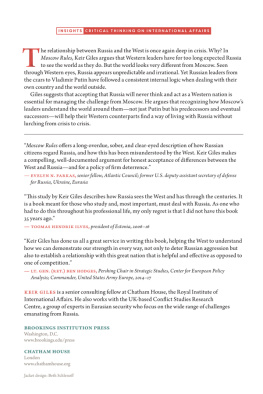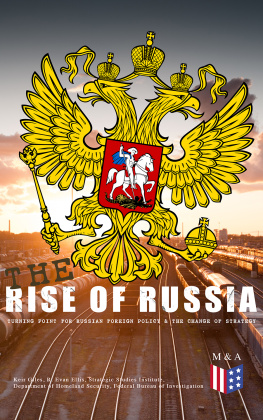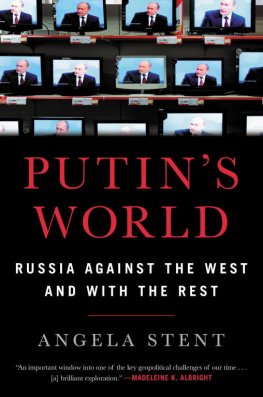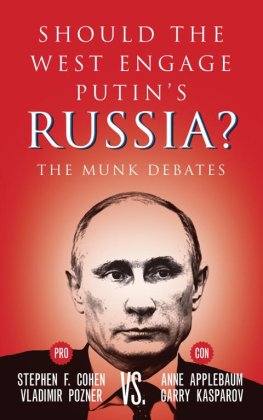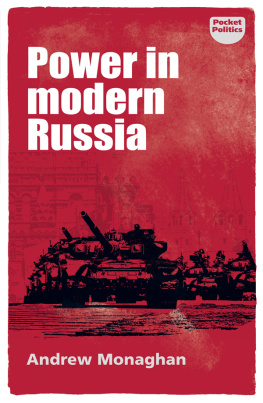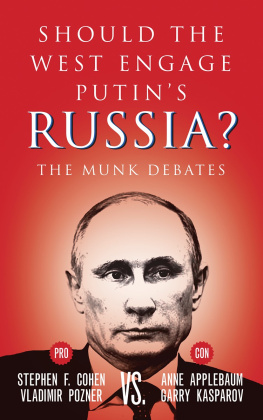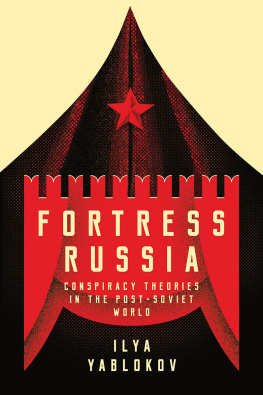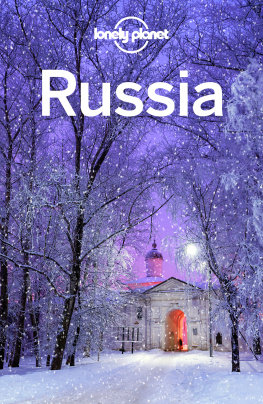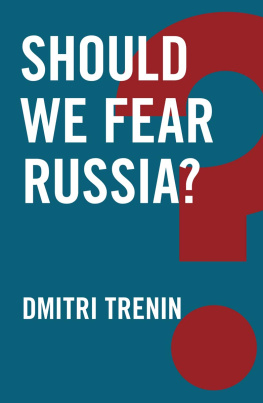Keir Giles has explained with clarity, concision, and deep knowledge why Russia cannot be understood by Western criteria alone. His book is a much-needed antidote to simplistic judgements. It should be required reading for all who deal with Western policy towards Russia.
SIR RODERIC LYNE, UK ambassador to Moscow 200004
Moscow Rules makes an important contribution to understanding the different viewpoints that exist in Russia and how Russias state system and influencing traditions differ from those of Western democratic countries in ways that have not always been comprehended. This is essential to understanding how the West can learn to distinguish real threats relating to Russia from those that only look like a threat but are not.
HANNA SMITH, Director of Strategic Planning and Responses at Hybrid CoE (The European Centre for Excellence for Countering Hybrid Threats)
Keir Giles has written the essential go-to book for anyone, everyonein government, the media, business, the military, or academiawho works with Russia or on Russia, or who needs to understand Russia to do their job. In a commendably clear, compelling, straightforward, and highly readable way, Giles explains not only how Russia thinks and works, but how it got there and why. His expert, sympathetic treatment of the subject is eminently practical and immediately applicable. I hope that every Western politician and political commentator will read and act on this book. Doing so would immediately put our relationship with Russia on firmer and safer ground.
CHRIS DONNELLY, Co-Director, The Institute for Statecraft
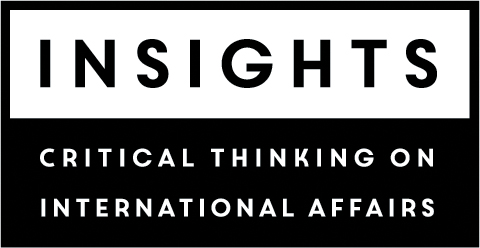
Providing new perspectives and knowledge on an increasingly complex, uncertain, and interconnected world.
The Chatham House Insights Series
Series Editor: Caroline Soper
The Insights series provides new perspectives on and knowledge about an increasingly complex, uncertain, and interconnected world. Concise, lively, and authoritative, these books explore, through different modes of interpretation, a wide range of country, regional, and international developments, all within a global context. Focusing on topical issues in key policy areas, such as health, security, economics, law, and the environment, volumes in the series will be written accessibly by leading expertsboth academic and practitionerto anticipate trends and illuminate new ideas and thinking. Insights books will be of great interest to all those seeking to develop a deeper understanding of the policy challenges and choices facing decision makers, including academics, practitioners, and general readers.
Published or forthcoming titles:
Amitai Etzioni, Foreign Policy: Thinking Outside the Box (2016)
David Lubin, Dance of the Trillions (2018)
Nigel Gould-Davies, Tectonic Politics: Global Risk in an Age of Transformation (forthcoming)
Chatham House, the Royal Institute of International Affairs, is a world-leading policy institute based in London. Its mission is to help governments and societies build a sustainably secure, prosperous, and just world.
Chatham House does not express opinions of its own. The opinions expressed in this publication are the responsibility of the author(s).
MOSCOW RULES

What Drives Russia to Confront the West
KEIR GILES
BROOKINGS INSTITUTION PRESS
Washington, D.C.
CHATHAM HOUSE
The Royal Institute of International Affairs
London
Copyright 2019
First published in Great Britain in 2019 by
Royal Institute of International Affairs
Chatham House
10 St Jamess Square
London SW1Y 4LE
www.chathamhouse.org
(Charity Registration No. 208223)
Distributed worldwide by
THE BROOKINGS INSTITUTION
1775 Massachusetts Avenue, N.W., Washington, D.C. 20036
www.brookings.edu
All rights reserved. No part of this publication may be reproduced or transmitted in any form or by any means without permission in writing from the Brookings Institution Press.
The Brookings Institution is a private nonprofit organization devoted to research, education, and publication on important issues of domestic and foreign policy. Its principal purpose is to bring the highest quality independent research and analysis to bear on current and emerging policy problems. Interpretations or conclusions in Brookings publications should be understood to be solely those of the authors.
Library of Congress Cataloging-in-Publication data are available.
ISBN 978-0-8157-3574-8 (pbk : alk. paper)
ISBN 978-0-8157-3575-5 (ebook)
9 8 7 6 5 4 3 2 1
Typeset in Adobe Garamond
Composition by Elliott Beard
This book is dedicated to all those career U.S. government officials who are working hard to build and deliver a sensible policy on Russia while hoping that President Trump doesnt notice.
Moscow Rules ( n., intelligence, apocryphal )the specific set of assumptions, approaches and procedures that must be adopted as an essential precondition for successful operations in Russia (formerly, in the Soviet Union).
Contents
Acknowledgments
Writing Moscow Rules was made possible by a grant from the Smith Richardson Foundation, whose assistance is acknowledged with deep gratitude.
Credit for the genesis of Moscow Rules must go to James Nixey of Chatham Houses Russia and Eurasia Programme, who asked me to come up with an idea for a new and original book on Russia, and only later explained that he actually wanted me to write it as well.
Also within Chatham House, ubica Pollkov has overseen the project with her customary patience, which as always has at times been sorely tested. And I am indebted to Julia Friedrich for painstakingly checking and updating every web address referenced in the book.
Lincoln Pigman and Jaroslava Barbieri provided essential support tracking down interviewees, obscure quotations, and references.
A particular thank you is due to the Kremlin press office for permission to use the image of Vladimir Putin on the front cover, and to Angel Sin for adapting the image to fit the czarist banknote.
Margaret May and Marjorie Pannell were the books highly professional editors, working on behalf of Chatham House and Brookings, respectively. They have rescued me from more than one error of misquoting or misinterpretation, but any errors of fact that remain are of course entirely my own.
Important corrections and contributions to the book came from a group of Russia experts convened in October 2017 to discuss the first draft. Duncan Allan, Mathieu Boulgue, Elena Fell, Ivan Kurilla, Edward Lucas, Eugene Rumer, Carl Scott, and Hanna Smith were kind enough not only to read the draft but then also to gather at Chatham House to offer usefuloften vitalsuggestions for improvement. Other respected colleagues, including Andrew Monaghan, Tomas Ries, Sulev Suvari, Nigel Gould-Davies, and Shima Keene, also offered helpful reviews and comments. In particular, Carolina Vendil Pallin overfulfilled the plan by contributing a magnum opus of corrections, recommendations, and discussion that would have made a substantial research paper on its own.
But the ideas and arguments presented in this book date not only from the last two years, but instead from all of the three decades that I have spent observing and studying Russia. As such, the greatest credit must go to the dozens of senior colleagues from Russia, Europe, and North America and from across the worlds of politics, diplomacy, the military, and academia who have listened to me, guided and corrected me, and given unstintingly of their time, knowledge, and insights over that period. They are, unfortunately, too many to name (and many would indeed prefer not to be named). But their importance to this book is every bit as great as the grand names of Russia studies, from this century and previous ones, who are cited repeatedly in its chapters.
Next page
